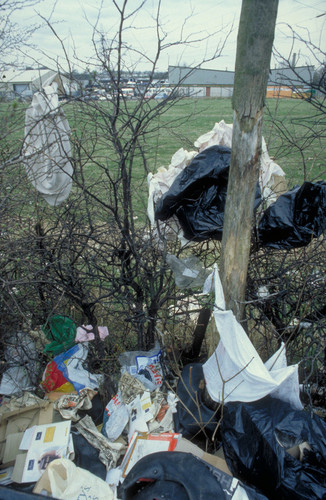Fly-tipping
 People convicted of fly-tipping offences can:
People convicted of fly-tipping offences can:
- receive substantial fines
- receive prison sentences of up to five years
- be made to pay the costs of enforcement, investigation and clean-up
- be made to give up any vehicles used to carry out fly-tipping.
What you must do
You are responsible for the disposal of any material that is fly-tipped on your land. You have a legal duty of care to ensure that the waste is disposed of or recycled at an authorised facility.
Duty of care - your waste responsibilities
If you arrange for the waste to be removed, you must check that the person who removes the fly-tipped waste is a registered waste carrier.
You must complete a waste transfer note before you pass your waste on to someone else, or a consignment note if the waste is hazardous/special waste. You and the waste carrier must both sign the note.
Good practice
If you discover fly-tipped material on your land, report it using the contact details available at:
This link provides information about who to contact. It applies to Northern Ireland and Scotland.
Do not touch the fly-tipped waste:
- It may not be safe, as the waste can include substances or objects that could pose a risk to you, like toxic materials or sharp objects. Do not open bags or drums. Piles of soil may be contaminated or hide dangerous material.
- You could disturb the site, where there may be evidence to assist in the investigation.
If you see anyone fly-tipping waste, take details of their vehicle, including its registration. Be discreet - remember that fly-tippers are doing something illegal and so they are unlikely to welcome people observing them or taking notes or photographs.
Before you arrange to dispose of the fly-tipped waste from your land, check with your local council or your environmental regulator that they have all the evidence they need for any investigation.
Tips for preventing fly-tipping
- Work out why your land is being targeted. You can then make your property less vulnerable.
- Install gates and barriers to prevent access. These can be in keeping with the natural environment, eg boulders. Make sure that you do not block a public right of way.
- Close gates when not in use and lock them if possible.
- Improve visibility so that fly-tippers are not hidden from view. Clear small areas of land or landscaping to reduce hidden corners.
- Install or improve lighting.
